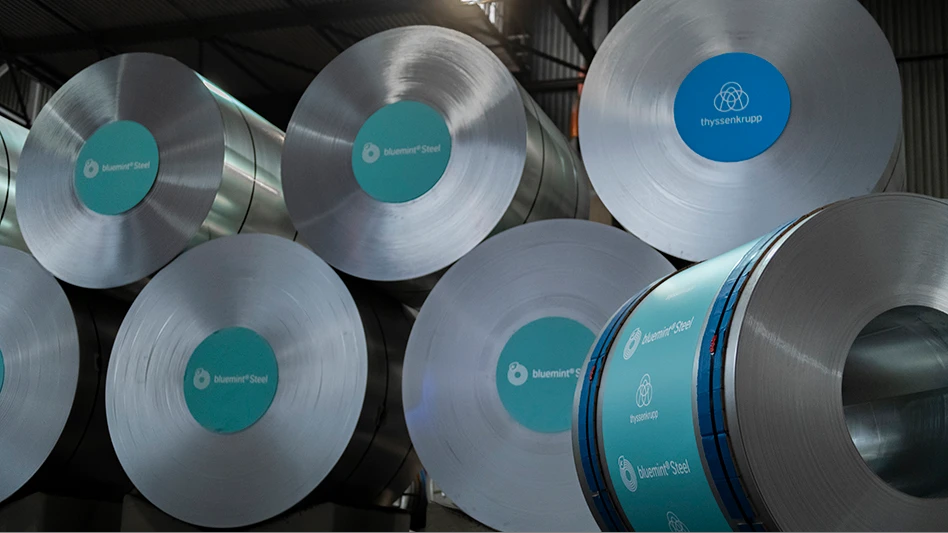
Photo courtesy of Thyssenkrupp Steel
Executives of Germany-based Thyssenkrupp Steel have presented a plan for the company’s future that involves shutting one steel mill complex in that nation and slashing 5,000 to 11,000 employees from its payroll.
The firm says it wants to lower its annual steelmaking capacity from 8.7 to 9 million metric tons. The initial step to reduce capacity will involve closing its Kreuztal-Eichen site in west central Germany, which includes considerable slitting, coating and pickling operations.
Thyssenkrupp Steel says it intends to cut around 5,000 jobs by 2030 “through adjustments in production and administration, while a further tranche of 6,000 jobs is to be transferred to external service providers or shed through the sale of business activities.”
The firm says it also is divesting from Hüttenwerke Krupp Mannesmann (HKM), a Duisburg, Germany-based blast furnace/basic oxygen furnace (BOF) steel producer. “The primary objective is to sell the shares in HKM. If a sale is not possible, Thyssenkrupp Steel will hold talks with the other shareholders about mutually acceptable closure scenarios,” Thyssenkrupp says.
In its Nov. 25 announcement, Thyssenkrupp Steel says it “remains committed to the green transformation and carbon-neutral steel production.”
The company says it still intends to complete a direct-reduced iron (DRI) plant already under construction that will replace two blast furnaces in Duisburg with 2.2 million metric tons per year of electric arc furnace (EAF) production.
“In the future, another blast furnace could be replaced by a modern EAF,” Thyssenkrupp Steel says. “A decision on this will only be taken at a later date and under the economic, technological and political conditions that apply at that time.”
“Comprehensive optimization and streamlining of our production network and processes is necessary to make us fit for the future,” Thyssenkrupp Steel CEO Dennis Grimm says. “The quality of our products and our technological expertise are a stable foundation for our future path. Our customers will continue to be able to rely on our high-quality flat steel products in the future.”
In parallel with the announced plan, Thyssenkrupp Steel parent company, Thyssenkrupp AG, is continuing the process of making the steel business independent, according to the two entities.
“In a first step, 20 percent of the shares in Thyssenkrupp Steel have already been sold to the Czech EP Group with the aim of increasing the stake to 50 percent.” EP Group (EPH) is a Prague-based company with a focus on the energy sector.
Latest from Recycling Today
- BMW Group, Encory launch 'direct recycling’ of batteries
- Loom Carbon, RTI International partner to scale textile recycling technology
- Goodwill Industries of West Michigan, American Glass Mosaics partner to divert glass from landfill
- CARI forms federal advocacy partnership
- Monthly packaging papers shipments down in November
- STEEL Act aims to enhance trade enforcement to prevent dumping of steel in the US
- San Francisco schools introduce compostable lunch trays
- Aduro graduates from Shell GameChanger program





